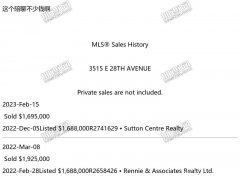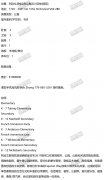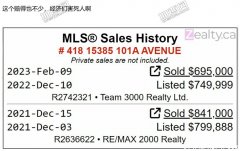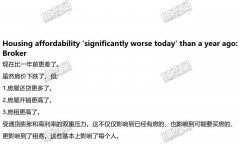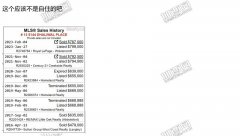加拿大华人论坛 加拿大房产想先学习学习租房合同
在加拿大
哪位有比较详细实用的租房合同,给传上来,英文的也可.先谢谢了.
评论
回复: 想先学习学习租房合同有没有热心人啊!
评论
回复: 想先学习学习租房合同刚找着,是04年的,不知有无修改.希望能给XDJM一些帮助.加拿大租房和约样本Residential Tenancy Agreement (British Columbia) THIS AGREEMENT made the _______ day of ________________, _________. BETWEEN (use correct legal names): _______________________________________________________________________________ (referred to in this agreement as \\\"the tenant\\\") AND _______________________________________________________________________________ (referred to in this agreement as \\\"the landlord\\\") 1. Address of residential premises The address of the premises to be rented is located at ________________________________ (Apt./Suite no.) _______________________________________________________________________________ (Street address) (City and province) (Postal code) 2. Address for service The address for serving notices and documents and the telephone number of the landlord or landlord\\\'s agent is: _____________________________________________________________ (Name, if different from landlord) _______________________________________________________________________________ (Apt./Suite no.) (Street address) _____________________________________________________________________________ (City and province) (Postal code) (Telephone number) 3. Term of agreement The term of this agreement will be as follows: This will be a [ ] daily or week-to-week tenancy which will begin on __________________________, _______. [ ] month-to-month tenancy which will begin on ________, _______. [ ] fixed term tenancy which will begin on __________, and end on _______. If the tenancy is for a fixed length of time, at the end of the fixed time - [ ] the tenancy may continue on a month-to-month basis or for another fixed time. [ ] the tenancy will end. 4. Rent The rent will be $_________________ [ ] per week, [ ] per month, and must be paid on or before the ________________ day of each [ ] week [ ] month. The first [ ] week\\\'s [ ] month\\\'s rent will be payable on ________________. The tenant must pay the rent on time. If the rent is late, the landlord may issue a Notice to End a Residential Tenancy to the tenant, which may take effect not earlier than 10 days after the date the Notice is given. 5. Included in the rent The following items, appliances, and services are included in the rent: (Check only those things that are included and provide additional inFORMation if required.) [ ] water [ ] electricity [ ] heat [ ] stove [ ] oven [ ] refrigerator [ ] dishwasher [ ] furniture [ ] window coverings [ ] carpets [ ] laundry facilities [ ] cablevision [ ] garbage collection [ ] parking for _____ vehicle(s) [ ] sewage disposal [ ] sheets and towels [ ] other: ________________________________ The landlord must not take away or make the tenant pay extra for a service or facility that is already included in the rent. 6. Security deposit The landlord acknowledges receiving from the tenant the sum of $_______________ on _________________(date) as a security deposit. The landlord agrees (i) that the security deposit must not exceed one half of the monthly rent payable for the residential premises, (ii) to keep the security deposit during the tenancy and pay interest on it in accordance with the Residential Tenancy Act, and (iii) to return the security deposit and interest to the tenant within 15 days of the end of the tenancy agreement, unless (a) the tenant agrees in writing to allow the landlord to keep an amount as payment for unpaid rent or damage, or (b) the landlord applies for arbitration under the Residential Tenancy Act within 15 days of the end of the tenancy agreement to claim some or all of the security deposit and interest. The tenant agrees to use the security deposit and interest as rent only if the landlord consents. 7. Rent increases Once a year, the landlord may increase the rent for the existing tenant. The landlord may only increase the rent 12 months after the date that the existing rent was established with the tenant or 12 months after the date of the last lawful rent increase for the tenant, even if there is a new landlord or a new tenant by way of an assignment. The landlord must use the prescribed Notice of Rent Increase FORM available from any office of the Residential Tenancy Branch or Government Agent. A landlord must give a tenant 3 whole months notice, in writing, of a rent increase. For example, if the rent is due on the 1st of the month and the tenant is given notice any time in January, even January 1st, there must be 3 whole months before the increase begins. In this example, the months are February, March and April, so the increase would begin on May 1st. If the tenant thinks the rent increase is unjustified the tenant may talk to the landlord or contact the Residential Tenancy Branch for assistance. If the issue is not resolved, the tenant may apply for arbitration under the Residential Tenancy Act within 30 days from the date of receipt of the Notice of Rent Increase. A landlord must give a tenant of a manufactured home pad 6 whole months notice, in writing, of a rent increase. If the tenant thinks the rent increase is unjustified, the tenant may talk to the landlord or contact the Residential Tenancy Branch for assistance. If the issue is not resolved, the tenant may apply for mediation by the Manufactured Home Park Dispute Resolution Committee. 8. Assign or Sublet The tenant may assign or sublet the residential premises to another person with the consent of the landlord. If this tenancy agreement is for a fixed length of 6 months or more, or is solely for the rental of a manufactured home pad, the landlord must not arbitrarily or unreasonably withhold consent to assign or sublet. Under an assignment a new tenant must assume all of the rights and duties under the existing tenancy agreement, at the same rent. The landlord must not charge a fee or receive a benefit, directly or indirectly, for giving this consent. If a landlord unreasonably withholds consent to assign or sublet or charges a fee, the tenant may apply for arbitration under the Residential Tenancy Act. 9. Repairs (a) Landlord\\\'s Duties: The landlord must provide and maintain the residential premises and residential property in a reasonable state of decoration and repair, making the residential premises and the residential property suitable for occupation by a reasonable tenant. The landlord must comply with health, safety and housing standards required by law. If the landlord is required to make a repair to comply with the above duties, the tenant may discuss it with the landlord. If the landlord refuses to make the repair, the tenant may seek an Arbitrator\\\'s Order under the Residential Tenancy Act for the completion and costs of the repair. (b) Tenant\\\'s Duties: The tenant must maintain ordinary health, cleanliness and sanitary standards throughout the residential premises and residential property. The tenant must take the necessary steps to repair damage to the residential premises and residential property caused by a wilful or negligent act or omission of the tenant or invited guests of the tenant. The tenant is not responsible for reasonable wear and tear to the residential premises. If the tenant does not comply with the above duties, the landlord may discuss the matter with the tenant and may seek a monetary order through arbitration under the Residential Tenancy Act for the cost of repairs, serve a Notice to End a Residential Tenancy, or both. (c) Emergency Repairs: The landlord must post the name and telephone number of the designated contact person for emergency repairs. The tenant must make at least two attempts to notify the person designated by the landlord, and give a reasonable time for completion of the emergency repairs by the landlord. If the emergency repairs are still required, the tenant may undertake the repairs and deduct the cost from the next month\\\'s rent, provided a statement of account and receipts are given to the landlord. The landlord may take over completion of the emergency repairs at any time. Emergency repairs must be urgent and necessary for the health and safety of persons or preservation of property and are limited to (i) major leaks in the pipes or roof, (ii) damaged or blocked water or sewer pipes or plumbing fixtures, (iii) repairs to the primary heating system, and (iv) defective locks that give access to the residential premises. 10. Occupants and Invited Guests (a) The landlord may not stop the tenant from having guests in the residential premises under reasonable circumstances. If the number of permanent occupants is unreasonable, the landlord may discuss the issue with the tenant and may serve a Notice to End a Residential Tenancy. Disputes regarding the notice may be resolved through arbitration under the Residential Tenancy Act. (b) If the tenant lives in a hotel, the landlord may impose reasonable restrictions on invited guests and reasonable extra charges for overnight accommodation of invited guests. 11. Locks Neither the tenant nor the landlord may change or add a lock or security device (for example, a door chain) to the residential premises unless both agree, or unless ordered by an arbitrator. In an emergency, the landlord may change the lock on the main door of the residential property and the tenant may change a defective lock on the residential premises and promptly provide the other party with a copy of the new key. 12. Entry of Residential Premises by the Landlord (a) For the duration of this tenancy agreement, the residential premises are the tenant\\\'s home and the tenant is entitled to privacy, quiet enjoyment and to exclusive use of the residential premises. (b) The landlord may enter the residential premises only if one of the following applies: (i) the landlord gives the tenant a written notice which states why the landlord needs to enter the residential premises and specifies a reasonable time not sooner than 24 hours and not later than 72 hours from the time of giving the notice; (ii) there is an emergency; (iii) the tenant gives the landlord permission to enter at the time of entry or not more than one month before the time of entry for a specific purpose; (iv) the tenant has abandoned the residential premises; (v) the landlord has the order of an arbitrator or court saying the landlord may enter the residential premises; (vi) the landlord is providing maid service to a hotel tenant at a reasonable time. (c) If a landlord enters the residential premises illegally, the tenant may apply for an Arbitrator\\\'s Order under the Residential Tenancy Act, to change the locks for the residential premises and keep the only key. At the end of the tenancy, the tenant must give the key to the residential premises to the landlord. 13. Ending the Tenancy (a) The tenant may end a month-to-month tenancy by giving the landlord at least one month\\\'s written notice. The landlord must receive the written notice before the day the rent is due, for the tenant to move out at the end of the following month. This notice must be in writing and must (i) include the address of the residential premises, (ii) include the date the tenancy is to end, and (iii) be signed by the tenant. For example, if the tenant wants to move at the end of May, the tenant must make sure the landlord receives written notice on or before April 30th. (b) The landlord may end the tenancy only for the reasons and only in the manner set out in the Residential Tenancy Act. The landlord must use the prescribed Notice to End a Residential Tenancy FORM available from the Residential Tenancy Branch. (c) The landlord and tenant may mutually agree in writing to end this tenancy agreement at any time. 14. Landlord\\\'s Obligation to Give Tenancy Agreement to Tenant In order for the landlord to insist on the perFORMance of the tenant\\\'s obligation to pay rent under the tenancy agreement, the tenant must receive a copy of this agreement promptly, and in any event not later than 21 days after the agreement was entered into. 15. Application of the Residential Tenancy Act The terms of this tenancy agreement and any changes or additions to the terms may not contradict or change any right or duty under the Residential Tenancy Act or a regulation made under that act and to the extent that a term of this tenancy agreement does contradict or change a right or duty under the Residential Tenancy Act or a regulation made under that act the term of this tenancy agreement is void. Any change or addition to this tenancy agreement must be agreed to in writing and initialled by both the landlord and tenant and must be reasonable. If a change is not agreed to in writing, is not initialled by the landlord and tenant or is not reasonable it is not enforceable. 16. Arbitration of Disputes Despite any other provision of this tenancy agreement, under the Residential Tenancy Act a tenant has the right to apply for arbitration to resolve a dispute. 17. Additional terms Write down any additional terms which the tenant and the landlord agree to. (Additional pages may be used.)___________________________________ ________________________ Landlord signature Date ___________________________________ ___________________________________ Tenant signature Date __________________________________ ___________________________________ Tenant signature Date __________________________________ ___________________________________ 租房广告中常见的简写 电器 appl. = appliance 单人套间,供一个人居住的公寓,有厨房和浴室(没有睡房) bach. = bachelor 单人套间别名studio 房屋bldg. 地库bsmt. = basement 浴室bath. = bathroom 靠近(某些设施)cl. = close to 睡房B.R./bdrm = bedroom 方便conv. = convenient 地板fl.or flr. = floor 带家具furn. = furnished 不带家具unfurn. = unfurnished 车房gar. = garage 即时imm. = immediately 包括incl. = included 厨房kit. = kitchen 大lge. = large 起居室L.R. = living room 近nr. = near 停车位pkg. = parking 担保ref. = referer 一边相连dup. = duplex 小sm. = small 分租sub. =sublet 套房ste. = suite 水电设施util. = utility
评论
回复: 想先学习学习租房合同谢谢LS的, 做个记号.
评论
明天又是新的一天回复: 想先学习学习租房合同非常感谢楼主
评论
Montréal回复: 想先学习学习租房合同mark
评论
回复: 想先学习学习租房合同谢谢分享
评论
美国运通金卡:AMEX Gold ,开卡送25000积分(价值250刀以上),首年销卡无任何费用,成功批核后本人再额外多给Cash Bonus感谢。同时主推 AMEX SPG 酒店卡,开卡送20,000 SPG点,可以兑换最高6晚美国喜来登酒店住宿,总价值可超600刀。详情请PM(此外还有Business Gold ,感谢力度与 Gold一致)。Tangerine (ING) Orange Key: 41710691S1 (本人同样额外返点)刚找着,是04年的,不知有无修改.希望能给XDJM一些帮助.加拿大租房和约样本Residential Tenancy Agreement (British Columbia) THIS AGREEMENT made the _______ day of ________________, _________. BETWEEN (use correct legal names): _______________________________________________________________________________ (referred to in this agreement as \\\"the tenant\\\") AND _______________________________________________________________________________ (referred to in this agreement as \\\"the landlord\\\") 1. Address of residential premises The address of the premises to be rented is located at ________________________________ (Apt./Suite no.) _______________________________________________________________________________ (Street address) (City and province) (Postal code) 2. Address for service The address for serving notices and documents and the telephone number of the landlord or landlord\\\'s agent is: _____________________________________________________________ (Name, if different from landlord) _______________________________________________________________________________ (Apt./Suite no.) (Street address) _____________________________________________________________________________ (City and province) (Postal code) (Telephone number) 3. Term of agreement The term of this agreement will be as follows: This will be a [ ] daily or week-to-week tenancy which will begin on __________________________, _______. [ ] month-to-month tenancy which will begin on ________, _______. [ ] fixed term tenancy which will begin on __________, and end on _______. If the tenancy is for a fixed length of time, at the end of the fixed time - [ ] the tenancy may continue on a month-to-month basis or for another fixed time. [ ] the tenancy will end. 4. Rent The rent will be $_________________ [ ] per week, [ ] per month, and must be paid on or before the ________________ day of each [ ] week [ ] month. The first [ ] week\\\'s [ ] month\\\'s rent will be payable on ________________. The tenant must pay the rent on time. If the rent is late, the landlord may issue a Notice to End a Residential Tenancy to the tenant, which may take effect not earlier than 10 days after the date the Notice is given. 5. Included in the rent The following items, appliances, and services are included in the rent: (Check only those things that are included and provide additional inFORMation if required.) [ ] water [ ] electricity [ ] heat [ ] stove [ ] oven [ ] refrigerator [ ] dishwasher [ ] furniture [ ] window coverings [ ] carpets [ ] laundry facilities [ ] cablevision [ ] garbage collection [ ] parking for _____ vehicle(s) [ ] sewage disposal [ ] sheets and towels [ ] other: ________________________________ The landlord must not take away or make the tenant pay extra for a service or facility that is already included in the rent. 6. Security deposit The landlord acknowledges receiving from the tenant the sum of $_______________ on _________________(date) as a security deposit. The landlord agrees (i) that the security deposit must not exceed one half of the monthly rent payable for the residential premises, (ii) to keep the security deposit during the tenancy and pay interest on it in accordance with the Residential Tenancy Act, and (iii) to return the security deposit and interest to the tenant within 15 days of the end of the tenancy agreement, unless (a) the tenant agrees in writing to allow the landlord to keep an amount as payment for unpaid rent or damage, or (b) the landlord applies for arbitration under the Residential Tenancy Act within 15 days of the end of the tenancy agreement to claim some or all of the security deposit and interest. The tenant agrees to use the security deposit and interest as rent only if the landlord consents. 7. Rent increases Once a year, the landlord may increase the rent for the existing tenant. The landlord may only increase the rent 12 months after the date that the existing rent was established with the tenant or 12 months after the date of the last lawful rent increase for the tenant, even if there is a new landlord or a new tenant by way of an assignment. The landlord must use the prescribed Notice of Rent Increase FORM available from any office of the Residential Tenancy Branch or Government Agent. A landlord must give a tenant 3 whole months notice, in writing, of a rent increase. For example, if the rent is due on the 1st of the month and the tenant is given notice any time in January, even January 1st, there must be 3 whole months before the increase begins. In this example, the months are February, March and April, so the increase would begin on May 1st. If the tenant thinks the rent increase is unjustified the tenant may talk to the landlord or contact the Residential Tenancy Branch for assistance. If the issue is not resolved, the tenant may apply for arbitration under the Residential Tenancy Act within 30 days from the date of receipt of the Notice of Rent Increase. A landlord must give a tenant of a manufactured home pad 6 whole months notice, in writing, of a rent increase. If the tenant thinks the rent increase is unjustified, the tenant may talk to the landlord or contact the Residential Tenancy Branch for assistance. If the issue is not resolved, the tenant may apply for mediation by the Manufactured Home Park Dispute Resolution Committee. 8. Assign or Sublet The tenant may assign or sublet the residential premises to another person with the consent of the landlord. If this tenancy agreement is for a fixed length of 6 months or more, or is solely for the rental of a manufactured home pad, the landlord must not arbitrarily or unreasonably withhold consent to assign or sublet. Under an assignment a new tenant must assume all of the rights and duties under the existing tenancy agreement, at the same rent. The landlord must not charge a fee or receive a benefit, directly or indirectly, for giving this consent. If a landlord unreasonably withholds consent to assign or sublet or charges a fee, the tenant may apply for arbitration under the Residential Tenancy Act. 9. Repairs (a) Landlord\\\'s Duties: The landlord must provide and maintain the residential premises and residential property in a reasonable state of decoration and repair, making the residential premises and the residential property suitable for occupation by a reasonable tenant. The landlord must comply with health, safety and housing standards required by law. If the landlord is required to make a repair to comply with the above duties, the tenant may discuss it with the landlord. If the landlord refuses to make the repair, the tenant may seek an Arbitrator\\\'s Order under the Residential Tenancy Act for the completion and costs of the repair. (b) Tenant\\\'s Duties: The tenant must maintain ordinary health, cleanliness and sanitary standards throughout the residential premises and residential property. The tenant must take the necessary steps to repair damage to the residential premises and residential property caused by a wilful or negligent act or omission of the tenant or invited guests of the tenant. The tenant is not responsible for reasonable wear and tear to the residential premises. If the tenant does not comply with the above duties, the landlord may discuss the matter with the tenant and may seek a monetary order through arbitration under the Residential Tenancy Act for the cost of repairs, serve a Notice to End a Residential Tenancy, or both. (c) Emergency Repairs: The landlord must post the name and telephone number of the designated contact person for emergency repairs. The tenant must make at least two attempts to notify the person designated by the landlord, and give a reasonable time for completion of the emergency repairs by the landlord. If the emergency repairs are still required, the tenant may undertake the repairs and deduct the cost from the next month\\\'s rent, provided a statement of account and receipts are given to the landlord. The landlord may take over completion of the emergency repairs at any time. Emergency repairs must be urgent and necessary for the health and safety of persons or preservation of property and are limited to (i) major leaks in the pipes or roof, (ii) damaged or blocked water or sewer pipes or plumbing fixtures, (iii) repairs to the primary heating system, and (iv) defective locks that give access to the residential premises. 10. Occupants and Invited Guests (a) The landlord may not stop the tenant from having guests in the residential premises under reasonable circumstances. If the number of permanent occupants is unreasonable, the landlord may discuss the issue with the tenant and may serve a Notice to End a Residential Tenancy. Disputes regarding the notice may be resolved through arbitration under the Residential Tenancy Act. (b) If the tenant lives in a hotel, the landlord may impose reasonable restrictions on invited guests and reasonable extra charges for overnight accommodation of invited guests. 11. Locks Neither the tenant nor the landlord may change or add a lock or security device (for example, a door chain) to the residential premises unless both agree, or unless ordered by an arbitrator. In an emergency, the landlord may change the lock on the main door of the residential property and the tenant may change a defective lock on the residential premises and promptly provide the other party with a copy of the new key. 12. Entry of Residential Premises by the Landlord (a) For the duration of this tenancy agreement, the residential premises are the tenant\\\'s home and the tenant is entitled to privacy, quiet enjoyment and to exclusive use of the residential premises. (b) The landlord may enter the residential premises only if one of the following applies: (i) the landlord gives the tenant a written notice which states why the landlord needs to enter the residential premises and specifies a reasonable time not sooner than 24 hours and not later than 72 hours from the time of giving the notice; (ii) there is an emergency; (iii) the tenant gives the landlord permission to enter at the time of entry or not more than one month before the time of entry for a specific purpose; (iv) the tenant has abandoned the residential premises; (v) the landlord has the order of an arbitrator or court saying the landlord may enter the residential premises; (vi) the landlord is providing maid service to a hotel tenant at a reasonable time. (c) If a landlord enters the residential premises illegally, the tenant may apply for an Arbitrator\\\'s Order under the Residential Tenancy Act, to change the locks for the residential premises and keep the only key. At the end of the tenancy, the tenant must give the key to the residential premises to the landlord. 13. Ending the Tenancy (a) The tenant may end a month-to-month tenancy by giving the landlord at least one month\\\'s written notice. The landlord must receive the written notice before the day the rent is due, for the tenant to move out at the end of the following month. This notice must be in writing and must (i) include the address of the residential premises, (ii) include the date the tenancy is to end, and (iii) be signed by the tenant. For example, if the tenant wants to move at the end of May, the tenant must make sure the landlord receives written notice on or before April 30th. (b) The landlord may end the tenancy only for the reasons and only in the manner set out in the Residential Tenancy Act. The landlord must use the prescribed Notice to End a Residential Tenancy FORM available from the Residential Tenancy Branch. (c) The landlord and tenant may mutually agree in writing to end this tenancy agreement at any time. 14. Landlord\\\'s Obligation to Give Tenancy Agreement to Tenant In order for the landlord to insist on the perFORMance of the tenant\\\'s obligation to pay rent under the tenancy agreement, the tenant must receive a copy of this agreement promptly, and in any event not later than 21 days after the agreement was entered into. 15. Application of the Residential Tenancy Act The terms of this tenancy agreement and any changes or additions to the terms may not contradict or change any right or duty under the Residential Tenancy Act or a regulation made under that act and to the extent that a term of this tenancy agreement does contradict or change a right or duty under the Residential Tenancy Act or a regulation made under that act the term of this tenancy agreement is void. Any change or addition to this tenancy agreement must be agreed to in writing and initialled by both the landlord and tenant and must be reasonable. If a change is not agreed to in writing, is not initialled by the landlord and tenant or is not reasonable it is not enforceable. 16. Arbitration of Disputes Despite any other provision of this tenancy agreement, under the Residential Tenancy Act a tenant has the right to apply for arbitration to resolve a dispute. 17. Additional terms Write down any additional terms which the tenant and the landlord agree to. (Additional pages may be used.)___________________________________ ________________________ Landlord signature Date ___________________________________ ___________________________________ Tenant signature Date __________________________________ ___________________________________ Tenant signature Date __________________________________ ___________________________________ 租房广告中常见的简写 电器 appl. = appliance 单人套间,供一个人居住的公寓,有厨房和浴室(没有睡房) bach. = bachelor 单人套间别名studio 房屋bldg. 地库bsmt. = basement 浴室bath. = bathroom 靠近(某些设施)cl. = close to 睡房B.R./bdrm = bedroom 方便conv. = convenient 地板fl.or flr. = floor 带家具furn. = furnished 不带家具unfurn. = unfurnished 车房gar. = garage 即时imm. = immediately 包括incl. = included 厨房kit. = kitchen 大lge. = large 起居室L.R. = living room 近nr. = near 停车位pkg. = parking 担保ref. = referer 一边相连dup. = duplex 小sm. = small 分租sub. =sublet 套房ste. = suite 水电设施util. = utility点击展开...
·加拿大新闻 卑诗保守党20名议员联署要求罗仕德辞去党领
·加拿大新闻 加拿大3.3万被遣返者"下落不明"!新移民急呼:防
·加拿大新闻 语文课被AI入侵?小学生用它写作文老师拿它改作文
·加拿大新闻 退休夫妇$175万30年内可飙到$500万!专家揭秘
·加拿大新闻 轰动国际!多伦多62岁华人"毒王"获刑16年!惊人资
·汽车 大家的自动续保保险价格都涨了吗?
·中文新闻 Lincoln's Rock:Blackpink 的 Jennie 访问后“爱死了”蓝山遗址
